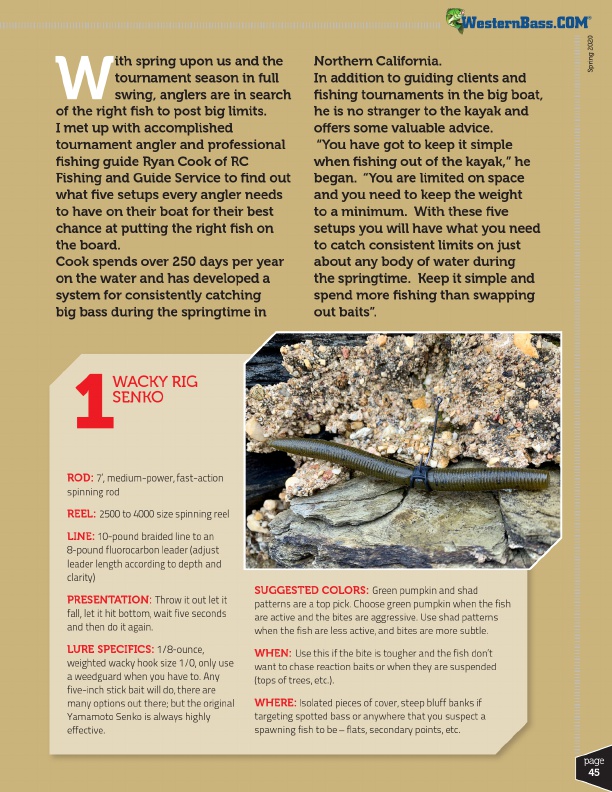
Spring 2020
W
ith spring upon us and the
tournament season in full
swing, anglers are in search of the right fish to post big limits.
I met up with accomplished
tournament angler and professional
fishing guide Ryan Cook of RC
Fishing and Guide Service to find out
what five setups every angler needs
to have on their boat for their best
chance at putting the right fish on
the board.
Cook spends over 250 days per year
on the water and has developed a
system for consistently catching
big bass during the springtime in
Northern California. In addition to guiding clients and fishing tournaments in the big boat, he is no stranger to the kayak and offers some valuable advice. “You have got to keep it simple when fishing out of the kayak,” he began. “You are limited on space and you need to keep the weight to a minimum. With these five setups you will have what you need to catch consistent limits on just about any body of water during the springtime. Keep it simple and spend more fishing than swapping out baits”.
®
1
WACKY RIG SENKO
ROD: 7’, medium-power, fast-action
spinning rod
REEL: 2500 to 4000 size spinning reel
LINE: 10-pound braided line to an
8-pound fluorocarbon leader (adjust leader length according to depth and clarity)
PRESENTATION: Throw it out let it
fall, let it hit bottom, wait five seconds and then do it again.
LURE SPECIFICS: 1/8-ounce,
weighted wacky hook size 1/0, only use a weedguard when you have to. Any five-inch stick bait will do, there are many options out there; but the original Yamamoto Senko is always highly effective.
SUGGESTED COLORS: Green pumpkin and shad
patterns are a top pick. Choose green pumpkin when the fish are active and the bites are aggressive. Use shad patterns when the fish are less active, and bites are more subtle.
WHEN: Use this if the bite is tougher and the fish don’t
want to chase reaction baits or when they are suspended (tops of trees, etc.).
WHERE: Isolated pieces of cover, steep bluff banks if
targeting spotted bass or anywhere that you suspect a spawning fish to be – flats, secondary points, etc.
page 45